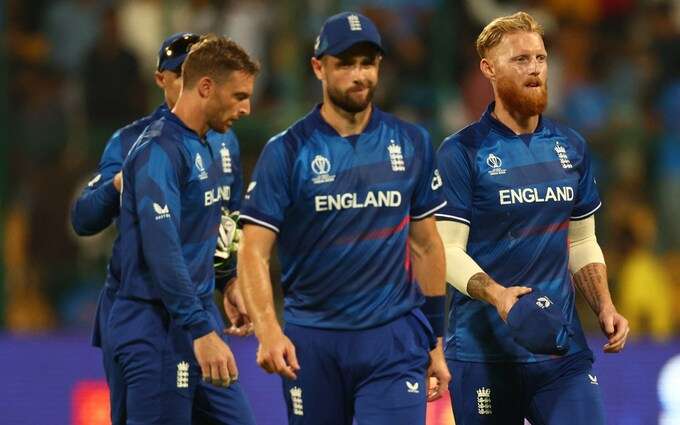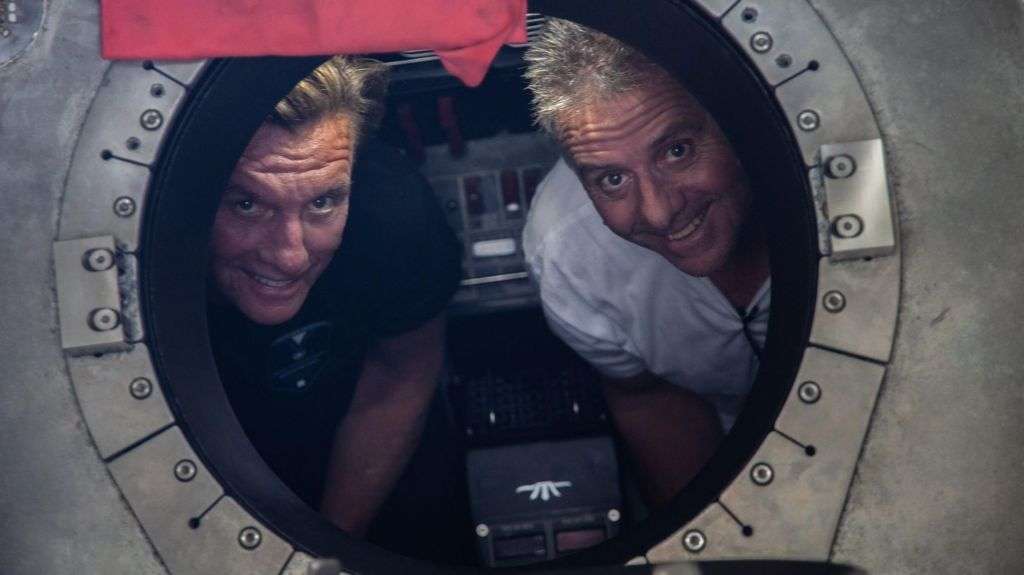As England's World Cup slumped to a new low, huge birds of prey circled overhead in Bengaluru.
Perhaps they too saw what the rest of us could.
England's World Cup defence was dying and, like Sri Lanka, they were ready to go in for the kill.
This situation is not new to England fans.
Their Test team of the early 2010s, first captained by Andrew Strauss and taken on by Alastair Cook, was the best team in the world, but fell apart in the space of one Ashes tour in 2013-14.
This white-ball outfit was a similarly great team - one that became the first men's side to hold both the 50-over and T20 World Cups - but now also lies in ruin.
These things take years to build, only to unexpectedly fall apart in front of our eyes before we can quite comprehend why.
And why, is the question English cricket will now be tasked with answering.
Yes, the schedule has left them underprepared.
Eoin Morgan's England achieved 50-over glory in 2019 after four years of meticulous planning.
Then they had 88 matches of fine-tuning. Leading up to this tournament, with the focus on Test and T20 cricket, England had just 42.
That number includes three matches immediately against Ireland last month when the World Cup squad was rested, three in Bangladesh without the Test players who were playing a series in New Zealand, and three more last year against the Netherlands, again when the Test players were playing the Black Caps at home.
Joe Root had two 12-month spells without playing a one-day international. Ben Stokes retired for a year because of the schedule and came back again.
England have not played often in 50-over cricket, and when they have it has not been with their best team.
But to put the blame solely on the schedule would let a tournament that has been muddled from the outset off the hook.
So too would pointing the finger only at The Hundred.
England's players had long stopped playing domestic 50-over cricket before it took prime position in the cricketing calendar.
Stokes has not played such a match in England since 2014, while captain Jos Buttler has not since 2016.
If it did not prevent them winning at Lord's in 2019 - it cannot take all of the blame now.
Instead, England should regret how their tournament has been a shambles from its very start.
On 16 August selector Luke Wright announced the 15 players to face New Zealand in a series in September would travel to India for the World Cup.
A week later Buttler said the door was not closed on the standout omission Harry Brook - a view which was repeated by coach Matthew Mott soon after.
The result was their one series of meaningful preparation, four matches at home against New Zealand, became all about Brook and eventually he was added and Jason Roy omitted last minute.
Next there was the curious case of bowler Jofra Archer.
Hope was built up when he was named as a travelling reserve despite his elbow injury, only for him to fly to India three games in.
He joined the team in Mumbai and trained for two days before being sent home when it was deemed he would not be fit after all.
Such jumbled thinking has been a theme throughout.
For the first game against New Zealand England stuck to a familiar formula - an XI packed with all-rounders to give batting depth and bowling options.
After the defeat by Afghanistan in Delhi, with Stokes now available after his badly timed hip injury, that plan was jettisoned as six specialist batters and five specialist bowlers were selected to play South Africa.
The result was the heaviest defeat in terms of runs in England's ODI history, and five days later in Bengaluru it was back to Plan A(ll-rounder).
Mistakes have also been been made at the toss.
Against Afghanistan, spooked by the dew which aided the Black Caps chase in Ahmedabad, England opted to bat second on a turning pitch against a batch of world-class spinners.
A week later in Mumbai, Buttler made the same call against South Africa in the stifling heat, conditions Root later described as "like eating the air". As the bowlers cramped, England conceded more runs than ever before in an ODI.
All of this has gone on with the issue of landmark, multi-year central contracts being negotiated in the background, before being announced two days before a crucial match in a World Cup.
Whether that distracted players or not, it resulted in David Willey wandering around the team hotel with his young children on the day he was confirmed as the one player in the squad without a contract going forward.
On Thursday he was still asked to open the bowling against Sri Lanka.
A day after the announcement, Moeen Ali gave an interview to the OceanNewsUK.
Given a gentle opening question - "How are you feeling going into this one, Moeen?" - he replied: "Obviously a bit anxious."
Honest or not, they were hardly the words of defending champions who used to puff out their chests and dominate with bat and ball.
When it came to the crunch, those worries showed as Dawid Malan's wicket sparked a sorry slide from 45-0 to 156 all out.
At that point England's World Cup was done.
Throughout this tournament the talk has been which of these players will want to stick around for the next edition in 2027, given the pull of franchise leagues.
After the 2013-14 Ashes, two England greats Kevin Pietersen and Graeme Swann never played again. Jonathan Trott and Matt Prior's retirements were not too far behind.
So shambolic has this showing been, some may not have that decision in their own hands.
In his post-match media conference, Buttler became the latest England captain to be asked whether he is the right man for the job.
The pause before answering suggested someone who could not quite believe how quickly things have fallen.
From the joy of Melbourne to the misery of Bengaluru in less than 12 months.
Buttler should be given the chance to stay, firstly because there is little time before another T20 World Cup in eight months. Secondly, he remains the best candidate.
Cook led a rebuild after that Ashes defeat and won back the urn two and a half years later. Buttler could lead a new generation.
But for now, like those Ashes series, the moment hope is lost is only the beginning on tours that provide no mercy.
Sixteen days remain until England play their final game, all while the vultures circle over a once-great team.








